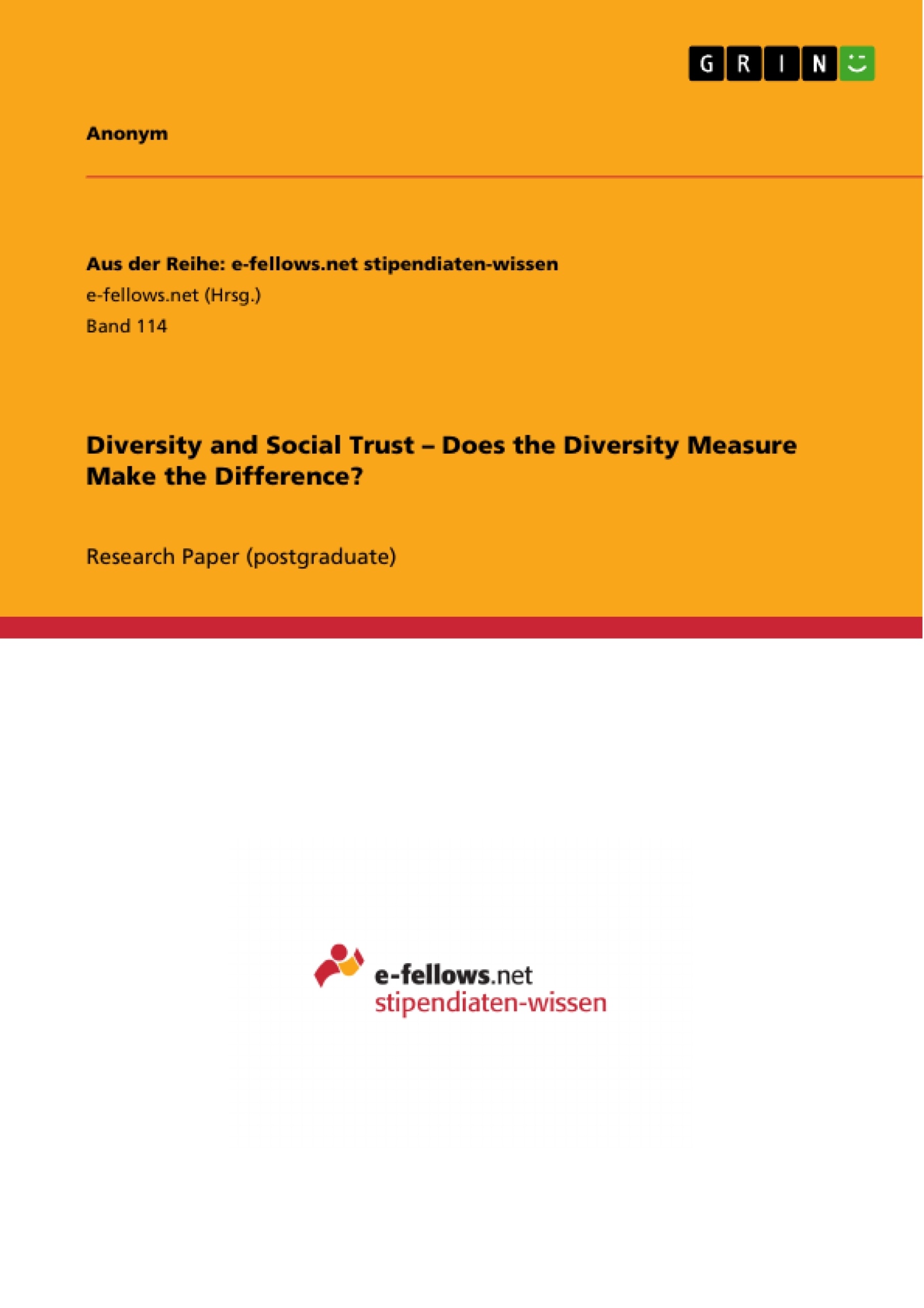Over the last decades, the rise of Social Capital as a central field of research in Social Science has contributed to an increasingly controversial and in-depth debate about trust. In particular, the identification of valid predictors for trust has been widely discussed, entailing various theories and outcomes. In the context of this course, this paper focuses on one specific predictor for trust, which has been generally accepted, namely the degree of diversity. Many scholars have applied this relationship of diversity and trust, yet by using very diverse definitions of what they understand by diversity.
This paper seeks at filling this gap of lacking conceptual clarification in terms of measuring diversity. We aim at answering the question whether or not the diversity measure has a significant impact on trust as the dependent measurement variable, and if so, which diversity variable matters most. For this research, we combine three papers related to the research question. Alesina et al. (2003) have presented a more comprehensive overview of diversity by introducing three different measures (ethnic, linguistic, and religious). Secondly, Fearon (2003) contributed to the topic through the refinement of the ethnic diversity measures, and the development of two indicators, ethnic and cultural fractionalization. Furthermore, he divided his large sample of countries into six world regions, a typology which we will also use in our study in order to identify possible peculiarities according to a certain region.
We will combine the three measures by Alesina et al. (2003) and the two by Fearon (2003) and correlate those five independent variables with the dependent variable “trust” on a country level, whose scores are taken from Bjørnskov (2008). The stronger the correlation, the more relevant we interpret the respective independent variable for trust. Moreover, we introduce viable controlling variables in order to eliminate external influences. After the already described screening for regional specialties, we finally execute a linear regression which would further explore the relationships between our variables of interest. We will argue on the basis of our findings that the diversity measure matters, in particular that ethnic fractionalization has the strongest impact on generalized social trust.
Inhaltsverzeichnis (Table of Contents)
- I. Introduction
- II. Methodology, Data Sources and Variables
- III. Results
- Bivariate Correlations: Aggregate Level
- Bivariate Correlations: Regional level
Zielsetzung und Themenschwerpunkte (Objectives and Key Themes)
This research paper aims to investigate the relationship between diversity and social trust, specifically examining whether the diversity measure significantly impacts trust. It explores the influence of various diversity measures on trust, including ethnic, linguistic, and religious diversity, while considering the impact of regional variations. The research seeks to identify which diversity variable has the strongest impact on trust and analyze the relationship between diversity measures and trust on both an aggregate and regional level.
- The relationship between diversity and social trust
- The impact of different diversity measures (ethnic, linguistic, and religious) on trust
- The role of regional variations in the relationship between diversity and trust
- The influence of controlling variables such as wealth, income inequality, and rule of law
- The significance of ethnic fractionalization on trust
Zusammenfassung der Kapitel (Chapter Summaries)
The introduction provides an overview of the research question and the existing literature on diversity and trust. The paper outlines the specific objective of examining the impact of different diversity measures on trust and identifies the key variables and methodologies used in the study.
The second chapter delves into the methodology, data sources, and variables used in the research. It explains the different measures of diversity employed, including ethnic, linguistic, and religious fractionalization, and details the data collection process. The chapter also discusses the trust measure used and the selection of countries and regions included in the study.
The third chapter presents the results of the analysis, focusing on the correlation between diversity and trust on both an aggregate and regional level. It explores the relationship between different diversity measures and trust, highlighting the significance of ethnic fractionalization in shaping trust levels.
Schlüsselwörter (Keywords)
The key terms and concepts explored in this research paper include diversity, social trust, ethnic fractionalization, linguistic fractionalization, religious fractionalization, wealth, income inequality, rule of law, regional variations, and correlation analysis.
Frequently Asked Questions
What is the central research question of this paper?
The paper investigates whether the specific way diversity is measured (ethnic, linguistic, or religious) significantly impacts the level of social trust in a country.
Which type of diversity has the strongest impact on social trust?
According to the findings of this study, ethnic fractionalization has the strongest negative impact on generalized social trust.
What are the three measures of diversity introduced by Alesina et al. (2003)?
Alesina et al. introduced measures for ethnic, linguistic, and religious diversity.
How does the study account for regional differences?
The study divides the country samples into six world regions to identify specific peculiarities and variations in the relationship between diversity and trust.
Which controlling variables are used to eliminate external influences?
The research incorporates variables such as national wealth, income inequality, and the rule of law to ensure more accurate results.
What methodology is used to analyze the relationship between variables?
The researchers use bivariate correlations at both aggregate and regional levels, followed by a linear regression analysis.
- Quote paper
- Anonym (Author), 2008, Diversity and Social Trust – Does the Diversity Measure Make the Difference? , Munich, GRIN Verlag, https://www.grin.com/document/175316



